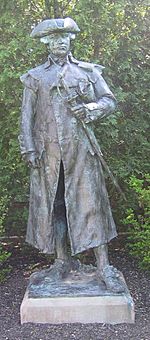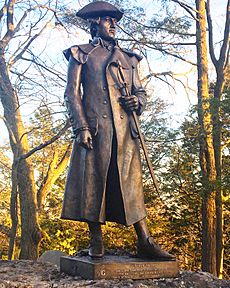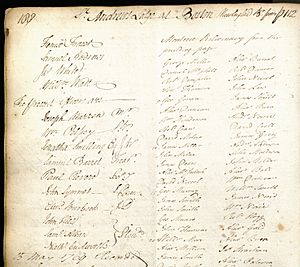Joseph Warren facts for kids
Quick facts for kids
Joseph Warren
|
|
|---|---|
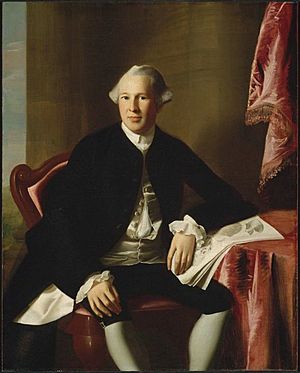 |
|
| 2nd President of the Massachusetts Provincial Congress | |
| In office May 2, 1775 – June 17, 1775 |
|
| Preceded by | John Hancock |
| Succeeded by | James Warren |
| Personal details | |
| Born | June 11, 1741 Roxbury, Province of Massachusetts Bay |
| Died | June 17, 1775 (aged 34) Breed's Hill, Charlestown, Province of Massachusetts Bay, British America |
| Cause of death | Killed in action in the battle of Bunker Hill |
| Resting place | Forest Hills Cemetery |
| Spouse |
Elizabeth Hooten
(m. 1764; died 1773) |
| Relations | Mercy Scollay (fiancée) |
| Children | Elizabeth, Joseph, Mary, and Richard |
| Education | Roxbury Latin School |
| Alma mater | Harvard College |
| Occupation | Physician |
| Signature | |
| Military service | |
| Allegiance | Massachusetts Bay United Colonies |
| Branch/service | Massachusetts Patriot militia |
| Years of service | 1775 |
| Rank | Militiaman Major general |
| Battles/wars | |
Joseph Warren (born June 11, 1741 – died June 17, 1775) was an important leader during the early days of the American Revolution. He was a physician and a Founding Father of the United States. Warren played a key role in the Patriot movement in Boston. He became the President of the revolutionary Massachusetts Provincial Congress.
On April 18, 1775, Warren sent Paul Revere and William Dawes to warn everyone. They spread the news that British soldiers were leaving Boston. The British planned to raid Concord and arrest rebel leaders John Hancock and Samuel Adams. Warren also fought in the Battles of Lexington and Concord the next day. These battles were the start of the American Revolutionary War.
Warren was made a major general in the colony's militia. This happened just before the Battle of Bunker Hill on June 17, 1775. Instead of leading as a general, he chose to fight as a regular soldier. He was killed during the battle when British troops attacked Breed's Hill. His death inspired the rebel forces. Many places in the United States are named after him, and there are statues in his honor.
Contents
Joseph Warren's Early Life and Education
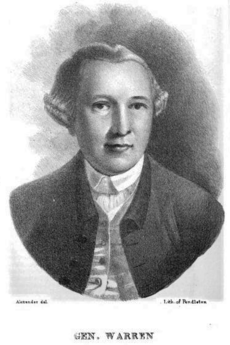
Joseph Warren was born in Roxbury, Province of Massachusetts Bay. His parents were Joseph and Mary Warren. His father was a farmer who died in 1755. He fell from a ladder while picking fruit.
Joseph went to the Roxbury Latin School. Then he attended Harvard College, graduating in 1759. After college, he taught at Roxbury Latin for about a year. He then studied medicine to become a doctor.
In 1764, he married Elizabeth Hooten. She passed away in 1773. They had four children: Elizabeth, Joseph, Mary, and Richard. Before his own death in 1775, he was engaged to Mercy Scollay.
Becoming a Patriot Leader
While working as a doctor in Boston, Warren became interested in politics. He joined other leaders like John Hancock and Samuel Adams. They were part of the Sons of Liberty movement. This group worked for American freedom.
In 1770, Warren examined the body of a young boy named Christopher Seider. He also helped write a report about the Boston Massacre. Before that, in 1768, he wrote an article using the name A True Patriot. British officials tried to put his publishers on trial for it. But no local jury would charge them.
In 1774, Warren wrote a popular song called "Free America." It was published in newspapers across the colonies. The song used the tune of a British song, "The British Grenadiers."
Joseph Warren also joined the Freemasons. He became a very important leader in the Freemasons in Massachusetts.
Warren's Role in Lexington and Concord
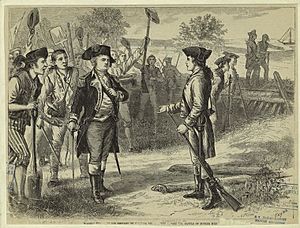
As the conflict with Britain grew, Warren became very active. He joined the Boston Committee of Correspondence. This group helped spread news and organize resistance. He gave speeches about the Boston Massacre. One speech was in March 1775, when British soldiers were in Boston.
Warren also wrote the Suffolk Resolves. These were ideas to resist unfair laws from Britain. The Continental Congress supported these ideas. Warren was then chosen as President of the Massachusetts Provincial Congress. This was the highest position in the new revolutionary government.
In April 1775, Warren learned that British troops were planning a raid. They wanted to destroy weapons stored in Concord. They also planned to go through Lexington. Warren quickly sent William Dawes and Paul Revere to warn everyone. Their famous "midnight rides" alerted John Hancock and Samuel Adams in Lexington.
Warren left Boston early on April 19. He helped lead the militia during the Battles of Lexington and Concord. He fought alongside William Heath as the British Army returned to Boston. A musket ball even hit his wig, nearly killing him. After the battle, his mother worried about him. He told her, "Wherever danger is, dear mother, there will your son be." He promised to fight for his country's freedom. He then helped recruit soldiers for the Siege of Boston. He also worked to share the Patriots' side of the story.
The Death of Joseph Warren
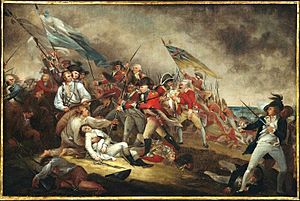
On June 14, 1775, Warren was made a major general. This was just days before the Battle of Bunker Hill. When he arrived at the battle, he asked where the fighting would be hardest. General Israel Putnam pointed to Breed's Hill. Warren chose to fight as a regular soldier, even though he was a general. He believed Putnam and Colonel William Prescott had more experience.
Warren helped inspire the soldiers to stand strong against the British. He was heard saying, "These fellows say we won't fight! By Heaven, I hope I shall die up to my knees in blood!" He fought until he ran out of ammunition. He stayed to help the militia escape during the British's final attack.
Warren was killed instantly by a musket or pistol shot to the head. A British officer likely recognized him. His body was stripped and put into a shallow ditch. Ten months later, his brothers and Paul Revere found his body. Revere identified him by an artificial tooth he had placed in Warren's jaw. His body was later moved to Forest Hills Cemetery.
Joseph Warren's Lasting Legacy
Many people say that Warren's death was a huge loss for the British. But for Americans, it made the revolutionary cause stronger. His death was seen as an act of martyrdom. It inspired many to fight for freedom.
When Warren died, his children were staying with his fiancée, Mercy Scollay. She continued to care for them. She also helped get support for their education from leaders like John Hancock and Samuel Adams. Joseph's younger brother, John Warren, was a surgeon during the war. He later helped start Harvard Medical School.
There are several statues of Joseph Warren. Three are in Boston, including one at the Roxbury Latin School. Another is at his grave site in Forest Hills Cemetery. A fourth statue is in Warren, Pennsylvania. This city, borough, and county are all named after him.
Fort Warren in Boston harbor is named in his honor. Many towns, counties, and streets across the United States also carry his name. For example, fourteen states have a Warren County. There are also towns like Warren, Pennsylvania, Warren, Michigan, and Warren, Massachusetts.
Five ships in the Continental Navy and United States Navy were named Warren to honor him. Warren Square in Savannah, Georgia, is also named for him.
Joseph Warren and Freemasonry
Joseph Warren was a Freemason. He was a member of Lodge St Andrews in Boston. He became the Master of the Lodge by 1769. Paul Revere was also a member of the same lodge.
Warren was appointed Grand Master of all Scottish Freemasonry in the 13 colonies. He also became Grand Master of the new Grand Lodge of Massachusetts.
The Grand Lodge of Massachusetts has an award named after him. It is called the Joseph Warren medal. This award honors Masons who have served their community, country, or humanity with great distinction.
See also
 In Spanish: Joseph Warren para niños
In Spanish: Joseph Warren para niños
- Patriot (American Revolution)
- List of Freemasons
- Boston Tea Party
 | William L. Dawson |
 | W. E. B. Du Bois |
 | Harry Belafonte |


